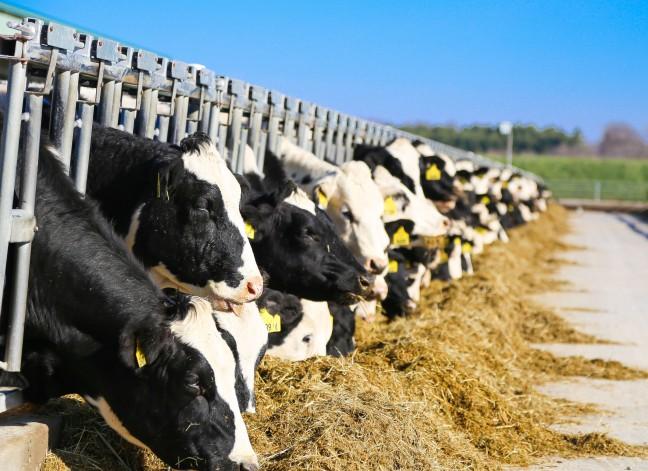Gov. Scott Walker tweeted about President Donald Trump’s visit to Wisconsin Wednesday, attaching a picture of a red baseball cap reading “Make Dairy Great Again.” In the tweet, Walker shared that he plans to give Trump the cap “to thank him for sticking up for Wisconsin’s dairy farmers in the trade deal with Canada.”
Announced earlier this month, the terms of the United States-Mexico-Canada Agreement specified Canada would open up more of its dairy market for trading. U.S. dairy farmers remain hopeful that the deal will lift the dairy industry out of a “deep slump,” but some, such as Wisconsin dairy farmer and president of the National Family Farm Coalition, Jim Goodman, are still doubtful.
“The impacts will be minimal,” Goodman said. “Canada’s entire dairy market is smaller than that of Wisconsin.”
Blows to Wisconsin agriculture show Trump’s disregard for his ardent supporters
U.S Dairy Export Council president Tom Vilsack added that Mexican and Canadian retaliatory tariffs are still in place, however.
According to the Milwaukee Journal Sentinel, “The U.S. dairy industry is getting hammered in trade disputes with Mexico, China and Canada, putting Wisconsin farms already in trouble at even greater risk.”
The Trump administration’s tariffs on foreign steel and aluminum prompted several countries, including Canada and Mexico, to impose retaliatory tariffs on a variety of U.S. products. According to Politico, the majority of Mexico’s retaliatory tariffs will apply to U.S. agricultural exports like cheese.
New tariffs on steel, aluminum are Trump’s haphazard apology to his most loyal constituents
Given that Mexico buys almost a quarter of all U.S. dairy products exports and “the American industry is reeling from $387 million in Mexican tariffs — of between 15 and 25 percent — on cheese,” according to the Journal Sentinel, the retaliatory tariffs in response to the Trump administration’s tariffs have been disastrous for Wisconsin dairy farmers.
The tariffs’ true consequences challenge the minimal effects of the October trade deal and Walker’s praise of Trump’s actions. The consequences also demonstrate how out of touch and disillusioned Walker and Trump are with the struggles of Wisconsin dairy farmers in recent months.
Additionally, Walker and Trump both fuel anti-immigrant sentiments in America, despite the fact immigrants, many of whom are undocumented, make up about 51 percent of all dairy workers in the U.S.
The Trump administration’s family separation policies and Walker’s use of the term “illegals” to make a jab Tuesday at Democratic gubernatorial candidate Tony Evers serve as clear examples, among others, that the two Republicans are anti-immigrant.
The Puentes/Bridges organization, however, works to form bonds and create a sense of understanding between Mexican farmworkers and their employers.
Puentes/Bridges is a non-profit organization founded in the 1990s when immigrants came to Wisconsin dairy farms looking for work. The nonprofit organizes trips to Mexico “… to bridge the cultural gap between farmers and their employees — and the physical gap between workers and their families.”
Wisconsin Republicans denounce Trump’s tariffs, cite consequences for Wisconsin economy
Roberto Tecpile, a worker from Veracruz, Mexico, has spent the past four years working for farmer John Rosenow in Cochrane, Wisconsin, and said it hurts to listen to Trump’s anti-immigrant rhetoric.
“Without workers, the United States is nothing,” Tecpile said. “We don’t come to make problems. We come only to work.”
Rosenow, a member of the Puentes/Bridges board of directors, said the program helped him understand more about the lives of his employees.
“I understand a little bit of their motivation to put themselves in danger to come here and to work in a different climate and to make money,” Rosenow said.
NAFTA replacement lacking in adequate aid for Wisconsin’s struggling dairy farmers
Trump and Walker’s anti-immigrant actions and rhetoric display their ignorance of the makeup the dairy workers they claim to support and demonstrate that they may not be the best equipped to represent Wisconsin dairy farmers in the future.
Walker and Trump are free to stand by their anti-immigrant rhetoric and protectionist policies, but they cannot simultaneously applaud a trade deal with marginal victories for a dairy industry still struggling with the consequences of Trump’s tariffs and immigration policies.
Instead, both Walker and Trump need to take a step back and understand immigrants’ significant contributions to the dairy industry and the ramifications of tariffs that were intended to help Americans rather than hinder growth.
Juliet Dupont ([email protected]) is a sophomore majoring in political science and journalism.














